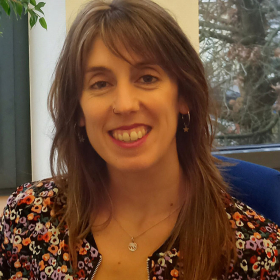

Leire, European Commission
« J’ai toujours adoré les langues et la communication. C’est pour cela que je n’ai pas hésité à m’inscrire au concours de traduction pour les institutions européennes. Mes études en Communication Audiovisuelle et Traduction m’ont effectivement donné l’expertise suffisante pour le réussir.
Travailler au sein de la DG Traduction de la Commission, c’est l’idéal pour moi ! J’adore le travail artisanal que représente la traduction : les recherches terminologiques, l’apprentissage quotidien de nouveaux sujets, le travail d’équipe... Je suis fière de rapprocher les citoyens de la législation de l’UE en contribuant à la qualité des textes qu’ils peuvent consulter, en aidant les experts à mieux exprimer leurs idées clés... La traduction, c’est un défi continu, une interrogation permanente : “Comment puis-je mieux exprimer cette nuance-là... ?”.
Au-delà de ma passion pour ce métier, Luxembourg s’est avérée être une ville fascinante et accueillante où la vie est rythmée par de nombreux évènements. Mon équipe de collègues y est d’ailleurs devenue ma deuxième famille. La preuve évidente de tout cela est que le dimanche soir n’est plus un moment morne, mais la veille d’une nouvelle semaine remplie d’expériences inédites ! »
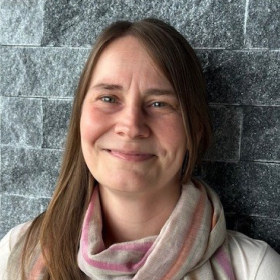
Malene, European Commission
“I love working with my languages in a place where it really matters and at a very high and professional level. I’m proud of contributing to facilitating EU lawmaking, translating legislation into Danish. It’s very inspiring to work in a team of like-minded colleagues who are also very passionate for languages. That common passion brings us the most interesting linguistic discussions, which I really enjoy and I think can be found nowhere else.
The international environment gives me freedom to live and enjoy my life in the way I choose. I love to travel, and the flexibility of my job allows me to see many new places. Kom ned og bliv en del af vores team! (EN: Come and join our team!)”
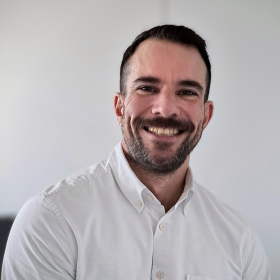
Ivan, Council of the EU
“I’ve been working as a lawyer-linguist at the Council of the EU for three years. In this role, we revise all EU legal acts that are to be adopted by the Council of the EU and the European Council, ensuring legal and linguistic consistency across all language versions. This allows me to combine my legal expertise with my passion for languages. I’m proud to contribute to the EU legislative process and to collaborate with fellow lawyers and assistants from nearly every Member State. There is a strong sense of community among us, and the atmosphere is always welcoming and supportive.”
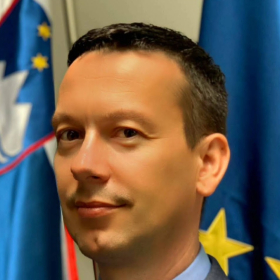
Matija, Council of the EU
“At the Legal Service of the General Secretariat of the Council, I have the opportunity to collaborate closely with colleagues from all EU Member States, working in all EU languages, and contributing to the quality of EU legislation.
As a lawyer-linguist, I especially enjoy working as a quality advisor and ʻchef de fileʼ, overseeing a team of lawyers and other administrators within the Council and from other institutions to legally and linguistically finalise the base language (English) version of legislative files. In these roles, strong coordination and leadership qualities are essential to completing all tasks within tight deadlines.”

Nelius, European Commission
“Working for the Quality of Legislation (LEG) team at the Legal Service is to be part of a highly professional and inspiring team.
We constantly seek and find the best way to apply drafting rules to exciting aspects of Union life such as the Covid crisis, rules on chemicals, the environment, health and safety protection, and finance. There is a strong reliance on team discussions to achieve the best approach for new situations – and discussions are invariably collegial and fruitful: no colleague is alone, we find solutions together.
On a daily basis, I feel that my colleagues and I are playing a meaningful, useful and vital role in Union law, and in participating in the project of an ever-closer Union, for citizens and businesses, in all 24 languages.”

Barry, European Parliament
Working as a lawyer-linguist at the Directorate of Legislative Acts in the European Parliament allows me to use my languages and legal expertise to play a vital role in the democratic process of the Union.
One of the most rewarding aspects of my job is advising Members of the European Parliament on legal drafting, helping to shape the legislation that affects millions of Union citizens. I really feel that I am at the heart of European law making!
The collaborative, multilingual environment makes every day intellectually stimulating, and I take great pride in ensuring that Union law is accessible to all.
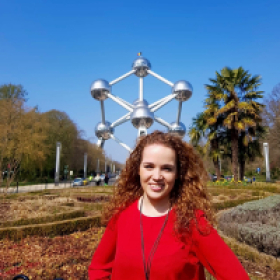
Tessa Pouels González, lawyer-linguist assistant in the Dutch team in the Directorate Quality of Legislation
My name is Tessa, I come from Spain and I work as a lawyer-linguist assistant in the Dutch team.
When I finished my master's degree in legal translation, I thought that my next step would be to work as a freelancer, but I am proud to say that the European institutions offer opportunities to motivated young people eager to be part of the European project.
Working at DQL – where we check the drafting quality of legal acts of the European Council and of the Council – is both challenging and rewarding, as you get to participate and gain an insight into the process of adopting legislation. It is most motivating to be part of a multicultural team with colleagues from different academic, professional and social backgrounds where you are constantly encouraged to continue growing personally and professionally, while benefiting from good working conditions, a wide range of training opportunities and the possibility to change jobs between services and institutions.
If you always wanted an international challenging and interesting career, I highly recommend working for the European institutions. Besides, life in Brussels is enriching and interesting with many activities and events to enjoy.
Lawyer-linguist assistant in the Dutch team in the Directorate Quality of Legislation (DQL) at the Council of the European Union
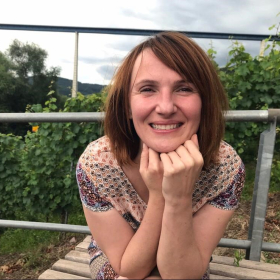
Agnieszka Wendel, linguistic assistant at the Polish Translation Unit
I have been working for the Directorate-General for Translation (DGT) Polish language department in Luxembourg for 15 years.
I studied Spanish Philology and American Studies in Poland, at the Jagiellonian University. Before working at DGT I was an official at the American Consulate in Krakow and wanted to continue my work path in an international environment.
I like my job because:
- I feel part of the European society,
- it’s never boring,
- it helps me develop as a professional.
Working at DGT gives me lot of satisfaction. I can feel I am doing something that really counts in the world. Dealing with everyday problems and world issues lets me see and understand what EU means for all of us. The job of the linguistic assistant gives me a lot of opportunities because it is developing along with the world. When I started 15 years ago it was a completely different kind of work. Everything developed, skills, software etc. I had the chance to acquire new computer skills, to learn German and French, to develop my social skills. I also had the chance to work for a few months in the European Parliament, which was one of the most exciting experiences for me.
The biggest challenge for me is to reconcile the professional and private life. I am a single mother with two young children, so I really appreciate how DGT lets me organize my working time (e.g., part time) to manage life in a way that is suitable for everyone.
I moved to Luxembourg in 2007, which was a big change for me, as I left a big city of almost 1 million inhabitants for a much smaller capital. Luxembourg welcomed me with rain, low traffic and its internationality. I really liked the efficiency of the public transport, which offered me many options to get to work smoothly and usually on time. Living in Luxembourg opens your mind. You can hear so many languages in the street, you can make friends from all over the Europe, you really feel you are a part of the world.
Linguistic assistant at the Polish Translation Unit at the European Commission (Directorate-General for Translation)

Sibila, European Parliament
“I have been working as a lawyer-linguist in the Bulgarian section of the Directorate for Legislative Acts at the European Parliament for almost 10 years. This is my first job within the European institutions, and I continue to value the diverse range of tasks I am involved in.
The core of my work is to revise EU legislative acts that are to be adopted by the Parliament and the Council, ensuring both their legal and linguistic accuracy. My role is to guarantee the highest possible quality of legislative texts while making EU law accessible and understandable across all Member States. This job allows me to work in both English and my native language, which I greatly appreciate. In addition, as a lawyer-linguist, I can contribute to the clarity and precision of EU legislation by advising Members of the European Parliament on legal drafting. Being part of the European Union law making process is highly rewarding and fulfilling.
The variety of tasks and the collaborative environment make the lawyer-linguist job dynamic, interactive, and satisfying. Moreover, my colleagues are multicultural, pleasant and supportive.”
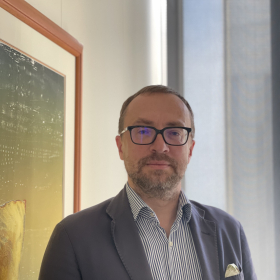
Marko (Lawyer linguist – Court of Justice of the EU)
My name is Marko, and as a lawyer-linguist at the Court of Justice of the European Union, my task is to ensure that court documents in foreign languages are translated into Estonian in such a way that the reader believes they were originally drafted in Estonian.
In my daily work, I not only need to be proficient in foreign languages, but, in addition to a solid knowledge of EU law, I must also be familiar with the legal systems of other EU Member States, sometimes creating new legal concepts in Estonian when necessary. As a quality advisor at the Estonian Translation Department, I believe that, alongside ensuring access to the widest possible body of case law in Estonian, it is crucial that our translations are as accurate as possible. This allows us to convey the true meaning of legal texts to Estonian readers.
Having worked at the Court of Justice of the European Union for over 20 years, I can confirm that the legal issues I translate are both highly engaging and topical, offering an opportunity to contribute personally to the development of the Estonian legal language. The rapid development of technology and artificial intelligence also presents daily challenges in my work – I have the extraordinary privilege of being at the heart of it all in Europe.
*****
Euroopa Liidu Kohtu jurist-lingvistina on minu ülesanne tagada, et võõrkeelsed kohtudokumendid oleksid tõlgitud eesti keelde nii, et lugejale jääks mulje, et need ongi algselt koostatud eesti keeles.
Minu igapäevane töö eeldab laialdast võõrkeelte oskust, liidu õiguse tundmist ning võrdleva õiguse analüüsi, mis hõlmab kõikide liikmesriikide õigussüsteemide mõistmist, selleks et kasutada tõlkimisel võimalikult täpset eesti õigusterminit või vajaduse korral luua uus termin. Eesti tõlkeosakonna kvaliteedinõunikuna seisan hea selle eest, et eesti keeles kättesaadava kohtupraktika tõlked oleksid võimalikult kvaliteetsed ja usaldusväärsed. Nii saab Eesti lugejale eesti keeles edasi anda õigustekstide tegeliku mõtte.
Olles Euroopa Liidu Kohtus töötanud üle 20 aasta, kinnitan, et tõlgitavad õigusprobleemid on äärmiselt põnevad ja aktuaalsed ning pakuvad võimaluse isiklikult panustada eesti õiguskeele arengusse. Tehnoloogia ja tehisintellekti kiire areng seab iga päev väljakutseid ka minu töös – mul on erakordne privileeg olla otse Euroopa südames.

